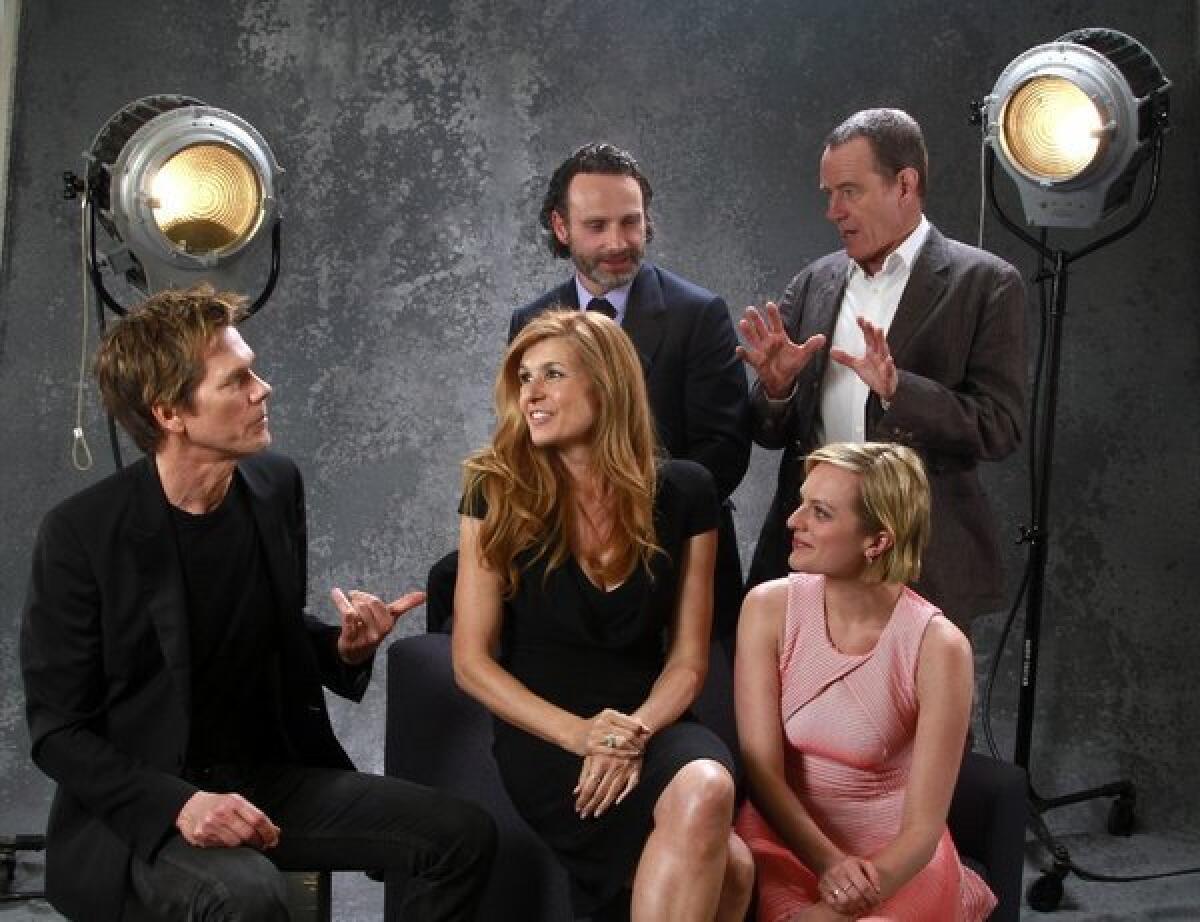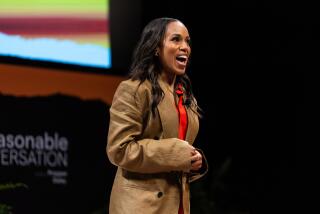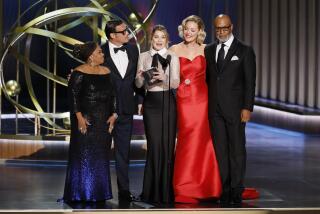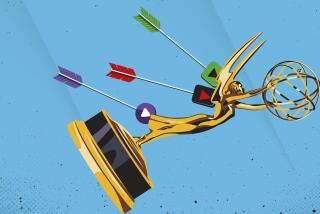Emmy Round Table: TV drama actors talk about the ‘Golden Era’ and more

Television has been proudly brandishing its “Golden Era” calling card of late largely on the merits of the many top dramas being produced on prime time and cable over the last few years. It’s a rise in quality such that any demarcation line between film stars and TV stars has been wiped away — film actors who may have once shunned the small screen are increasingly embracing television dramas, proclaiming that the most creative stories and interesting characters are to be found there, and TV actors, well, they know a good thing when they’ve got it.
The Envelope invited five such actors to take part in the Envelope drama panel — Bryan Cranston of “Breaking Bad,” Connie Britton of “Nashville,” Andrew Lincoln of “The Walking Dead,” Elisabeth Moss of “Mad Men” and Kevin Bacon in his first TV series, “The Following.” Their conversation took on strong female role models, violence on television and how any of us, really, could be a killer if pushed hard enough.
Here is the transcript of that April 30 conversation at the L.A. Times; it has been edited for length:
WATCH: The Envelope Emmy Roundtable | Drama
Critics say this is the golden age of television. How do you feel about the state of dramatic TV, and what is it like to be a part of that equation?
Elizabeth Moss: I think that it is very much a golden age. And I feel very lucky to be around at this time when there are such incredible roles for women. I feel like I’ve witnessed the divide between film and television and even theater kind of disintegrate and fall apart. And now that television is—it has such a high caliber and is so good and the scripts are so good ... and it allows for actors to have a lot more freedom, to be able to go to a lot more places and do more interesting things.
Andrew?
Andrew Lincoln: Yeah, I mean, I came [to American television] because of two people that I’m sitting with, two performances that I’ve watched on AMC, Elizabeth and Brian. You know, [their shows] were the things that put AMC on the radar for me as an actor in England. And I loved “The Wire” and “Sopranos.” You just name all of these incredible shows that were going across the globe from this country that made me sit up and just think there’s terrific writing; great character-driven stories in American television. And I never thought that I would bag one of them. There’s no coincidence that it’s attracting such incredible actors because it’s all gotta be driven by the writing.
Is it the writing, Kevin?
Kevin Bacon: Yeah, totally. You know, when a writer is on a movie, a lot of times they’re kind of persona non grata. You don’t want ‘em on the set. They get rewritten. And I think that it starts to get frustrating for writers. And on television, they’re it. They’re the big man on campus. And, and if, if you can have that kind of power and influence to be able to really create something and kinda put your mark on it, it’s going to draw the best people. And, you know, from my experience, the call that I made to actually say that I was interested in doing a television show, it was a difficult call for me to make because I came up in a time when that’s not where you wanted to go. I left ‘The Guiding Light’ — Brian was on a soap too. And I was like, “I’m never going back to television.” I was kind of a snob about it like, in terms of my own involvement. But at the same time, I was watching these guys and other amazing shows, and I was married to an actress who was on a show. And from the second I made the call [to consider TV], I mean, within two weeks, I had read three of the best scripts that I had read ever. It was kind of a no-brainer. I was sorta like, “Schmuck, what took you so long?”
Bryan Cranston: Did you think that, at the time, that it would be like, a career killer if you went into television from starring in movies?
Bacon: I did. I mean, it was just, it was a leftover feeling, you know. Some habits they die hard. But, you know, like I said, the second I sort of threw my hat in the ring, first off, I felt a great sense of excitement and of relief. And it was really based on just these characters that were options to play, just like great characters that I just hadn’t gotten—or I wasn’t seeing that many opportunities in movies.
Connie Britton: I also think that there is a freedom in television. You really have an arc of time to create, there’s a freedom to be courageous for our writers. They can push themselves and think outside the box of what they would normally think about writing if they’re just writing a film, you know? Film is very finite. And so with television, there’s a freedom to meander a little bit and to explore characters a little bit and to delve into something that maybe you wouldn’t have the guts to do because you only have this hour and a half time period to cover. So there’s something to me that’s exciting about TV for that reason.
You started “Breaking Bad” when TV drama was getting good, and now it’s great. So you’ve really seen an evolution in the last several years.
Cranston: Yeah, I had the same thought that Andy had. When I was offered the role in “Breaking Bad,” Rob Sorcher at AMC—he’s not there anymore, but he was developing it. And he said, “Well, don’t say anything.” Because I was concerned that such a beautiful pilot script, you want to take care of it, you know, because it can be fragile. You can take a wonderful piece of material and just ruin it. So I told my agency I’d like to talk to AMC because they were the movie channel. And so are they going to dive in and support this? And I got into that conversation. He said, “Wait a second. Let me send you a show that we’re doing. It hasn’t aired yet, but it’s called “Mad Men.” Let me send it to you, the pilot, and then we’ll talk.” It comes. I pop it in. I watch it. And I went, “Oh, my god. This is an incredible storytelling.” That’s the foundation, no matter what medium you’re in. But I think especially for now, there’s a golden age of television because I think people really got smart about this and realized that the material should dictate the medium, not the other way around. That all of our shows here would not make good movies. You would have to truncate the stories and ditch some really wonderful character development.
PHOTOS: Celebrities by The Times
Britton: Well, in the case of “Friday Night Lights,” it was a movie, and I was in the movie playing the same part. And I went to the premier and thought that my character had been made mute, you know, (laughs) because I had so little to say. And part of what was wonderful about being able to do [the series] for all of us and particularly for Pete Berg, who wrote the movie and also the pilot for Friday Night Lights, he wanted very much to give the women, in particular, of that community a voice because he couldn’t do that in the film.
We’ve got two people here who are at different stages of this arena. Kevin, you’re opening a door into it, and Bryan, you’re getting ready to close the door. I want to ask you specifically—
Bacon: Johnny Come Lately. (laughter)
Overall, what was the experience of being on the show like, and were there any surprises or challenges that you weren’t anticipating?
Bacon: I knew a certain amount about it because of having directed a lot of “The Closer” and having spent time and seeing that world and seeing secondhand, you know. My wife [Kyra Sedgwick] would come home, and she had this little tape recorder and she’s sitting there all weekend. And then every time I want to do anything with her, she’s like, “Sorry. We’re running lines.” I could see that grind. But I found it really enjoyable. I’ll tell you why. Because I stopped and I looked at my life, and in the course of a year, like maybe 5% of my time I’ve spent acting. Five percent of my time was between “action” and “cut.” The rest of it is, you know, promoting something, waiting for lighting setups, traveling, hopefully reading stuff, waiting for the phone to ring. I really like to act, that’s really what I like to do. And when you’re on a TV show, you act your ass off. Ten pages, you know, in a day as opposed to 10 pages in a month or two months or whatever it is. So even with the pace and with the hours, I get home and I’m exhilarated. I’m sure you would all agree that when you play a character over a period of time, they can throw you into any kinda situation, and you know how your people will react. So you can kind of go with that instinct sort of thing as opposed—
Britton: You want them to throw you in the middle of this.
Bacon: Yeah. Sure you do.
Britton: Like, that’s the fun of it is you have all this opportunity to have your character go through all these twists and turns.
Bacon: Yeah. So I found it great. I mean tiring and definitely a very, very in our case dark place to go. There was too much killing and too much dying and too much just, you know, like tragedy for me to be able to turn it on and off like a faucet. So it was a dark place for sure for the months that we were doing it, but at the same time exhilarating.
Speaking of darkness—You have been miraculous in playing one of the darkest and most twisted people ever.
Cranston: Well, I just think he’s misunderstood. (laughter)
But it’s gotta be, like Kevin said, not the easiest thing to put on the skin of this guy.
Cranston: Actually, there’s a little bit of protection that comes when you’re doing it in the third or fourth or fifth or sixth seasons. You know, and mostly it’s like a talisman. I put on my wallabies and my hat and I shave my head and I grow my goatee out. And I look in the mirror and go, “Oh, yeah, there he is.” And you just kind of let it inside. And I did find places because of the fact that the series got dark that I wanted to lighten it up. I wanted to play the practical jokes on people and have fun because that’s what we’re there for. We want to have fun during the process.
There’s really no fun when you’re in the middle of a zombie apocalypse. (laughter)
Your show, just right off the bat, was a phenomenon. First of all, what was it like sort of coming from British television to American television and just getting on this fast-moving train?
Lincoln: I was terrified. You know, the first—the pilot episode in the show that I’m in, I’m isolated for a lot of the first part of the story. And so I remained quite alone for a lot of it. But then after a while, you realize it’s an ordinary film set, and I knew what all the people did. And then after a while, it became incredibly comfortable. But it was very much about dialect first. I went out early just to, you know, because if you’re going to have the honor of leading or being involved in playing an iconic sort of American role, I wanted to get that bit out of the way before the zombies. You know what I mean? So I could focus on killing them.
(laughter)
Lincoln: But it, you know, just to work with extraordinary people like Frank Darabont, I mean, he was the guy that took me onto the plane to do the screen test. And when I read the pilot episode, I realized what they wanted to do with it. I thought this is the most extraordinary way to sort of distill humanity, to tell this story in this extraordinary landscape. But actually all it is, is just about what it is to be human, you know. And the story that really made me want to sort of take the role was not my character. It was Morgan. There’s a story about the first human that [Rick] meets is this guy Morgan and his son. And I just got it. I just thought that that was such a bold and brave and unique way of telling this story.
PHOTOS: Hollywood backlot moments
“Mad Men” isn’t quite as dark as “The Walking Dead,” but what impresses me about your role is that we’ve seen you grow season by season probably more than any other character on that show.
Moss: I feel very lucky to have that particular female role on the show because of that, because I think that she’s had this crazy arc and has grown up so much. Part of that is just by virtue of the fact that she’s 20 in Season One, and she’s, I don’t know, 26 or 27 now, I guess. And I was 23 when we made the pilot, and now I’m 30. So for me, it’s been really interesting to go through my own experiences and have that inform Peggy and often experience a crazy kind of mirror situation that happens with Peggy and me.
How do you connect, you’re a modern girl, and Peggy’s back in the ‘60s?
Moss: I never thought of it like that. I didn’t care that she was a ‘60s girl. I wanted to play her like me, like a woman of any time because I think that there are things that she experiences and things that all the women on the show experience that we still experience today, maybe in varying degrees. So for me, what I connected to was that she was just a young woman.
Connie, you’ve been in two amazing shows where you’ve played strong, independent women. You are considered a role model. What is that position like?
Britton: It’s really rewarding and surprising, particularly playing a role in “Friday Night Lights.” That was something that I think really impacted the women who saw it. And, you know, looking back on it, it was sort of built for it, I guess. I mean, I was playing a high school counselor and there was a lot there. And I was in this great marriage. And, you know, I have people still, to this day, come up to me and tell me that they want their kid to see the scene where I talk about sex with my daughter. So certainly when “Friday Night Lights” was over, I definitely was almost stunted in a way by having this sense of responsibility that I needed to somehow maintain, you know, this role model or this image that I was putting out into the world. Thankfully, then I went and did “American Horror Story,” which kind of just demystified all of that and made it a lot less precious and gave me a good sense of humor about what I’m doing in the world.
You’re all with a group of people where each week, you don’t know what family member’s going to be around the following week. What is that like for you?
Lincoln: Well, it is a bit of an occupational hazard, you know? And I didn’t sort of read the small print when I decided to do the job. We’ve lost so many amazing friends. And it is a family. It does feel like that. You galvanize, and you spend so much of your waking hours with these people. And it is incredibly sad that you have to say goodbye to these brilliant characters first and foremost, you know, and then dear friends that you’ve made. I lost my wife in this last season, Sarah Wayne Callies, who’s the greatest leading lady I’ve ever had the privilege of working with. [Quickly to Moss and Britton] I’m looking forward to working with you two ladies soon.
(laughter)
Moss: Until us.
Lincoln: Until you guys.
Moss: No offense.
(laughter)
Lincoln: It was heart-wrenching when I got the call from the show runner directly after he made the call to her because it has so many reverberations, not just on me. It’s because she’s got a young child like we have. Her husband is great friends with my wife. It’s not only the ramifications for your character, it’s this domino effect with this family that you work with.
That particular scene (when Rick returns to base to discover his wife has died) was heartbreaking and gut wrenching —was there some of that feeling in occupying that scene?
Lincoln: Yeah. I was saying goodbye to a dear friend. I did a long preparation — for two hours — while people were setting up. By preparation, I mean, I listen to music and get myself into a place. I took my contact lenses out because I thought, maybe I will cry in this. And I just wanted to honor her departure as well — and it was the kid that did it for me. I looked at Chandler Rigs, who plays my son, this genius child who’s been discovered out of nowhere. And I had said to the director before, “I think this is the moment where you have to see the man that has been so strong, fall. I want to see him drop his gun. I want to see him kneel. The two things that have driven him the whole season, his motives operandi have been driven by two people: His wife and his son. One of his legs has just been taken away.” And so we sort of vaguely plotted it. And it was the kid that undid me. He just looked at me and gave confirmation silently that she was gone. And it just went into a different place, you know?
Acting is such a craft. I’m so used to seeing you as Peggy and then you did this miniseries, “Top of the Lake,” which was about as far from “Mad Men” as you could get. I mean, this detective who’s very haunted and gets involved with some twisted people. Your character was so raw and had to bare herself in every way. What was that experience like?
Moss: It was super fun, getting the chance to fight and run, and scream and cry — and “Mad Men” is so subtle, that’s the beauty of it. And it’s not easy to do, that kind of acting, by any means, but it’s a very specific kind of style. And just to get the chance to use other muscles for me was so awesome. And then the fact that it was obviously Jane [Campion], somebody that, I mean, anyone would want to work with. And she’s sort of known for her kind of female performances. I didn’t even know if I could do it. And Jane didn’t know if I could do it. And then once I kind of half convinced her that I could, then I went through that thing that I’m sure every single person here has gone through, where you’re like, “Oh ..., they think that I can do this.” And then eventually, scene by scene and day by day, you start building a character.
Playing Hal in “Malcolm in the Middle” and then doing Walter — which character was more challenging for you?
Cranston: Well, I loved both those guys. I think the thing that all actors are really looking for is opportunity. I’ve just been extremely fortunate to be able to do that on a spectrum that is—one’s way over here, and one’s way over here. It’s just basically different aspects of your own characters that you’re exploring. For instance, with Walter White, I said as a joke I think he’s misunderstood. But the truth is I think everyone is capable of doing severe damage to themselves or to society or to another human being depending on the condition of that person. Sociologically, this is where I went in working on this guy, finding out how is it possible to start a character as a nebeshy kind of sad sack who got a bad hand dealt to him and cancer and he’s got a son who is special needs and he doesn’t make enough as a teacher, so he’s gotta have a second job. And how does that guy become a killer, an absolute killer? And I think all of us are capable of being that guy if the right buttons were pushed, if the sense of desperation were present. If I knew really well what makes each one of you tick and I got to see what you’re afraid of and I started pushing the buttons, all of a sudden, we’d all have those reactions.
For Ryan, it seems like his chance for redemption or opportunities for redemption are far, far off. To occupy that, how is that for you?
Bacon: I was really drawn to the flaws of who he would be, starting with this heart thing, this pacemaker that he has. When I first met with [series creator] Kevin Williamson, he said, “Well, when you were fighting with Joe Carroll, you were stabbed in the back. And so you have a limp.” And I said, “So let me just get my head around this. You just had me sign a six-year contract, so I’m gonna be limping for six years?” And he said, “Well, you know, there was this draft where he had this pacemaker.” And I said, “That sounds amazing. What does that look like?” And he pulled back his shirt. And I said, “That’s it, man.” Because it’s metaphoric, of course, but it’s also—every time he goes into some kind of a physical thing, whether it’s a fight or a chase or whatever, there’s always this kind of ticking time bomb of losing your life. And to that, we added the vodka. And to that, basically, sadness, you know, and isolation. So, you know, I like that. (laughs)
There’s also the issue of violence that’s been a hot-button issue. Your show certainly has had that. Every second of your show has it. What is your feeling about the violence on the show and the controversy of some of that?
Bacon: Well, you know, if we’re making a scary thriller that’s about a serial killer, there’s gonna be some violence. I guess the question is violence in the media and should it be part of the discussion? Yeah, it should be. And you can also turn the television off if you have young children. I also feel like it’s just a piece of the discussion in terms of violence in our society right now, to 100% blame it on TV shows is moronic.
More to Read
The complete guide to home viewing
Get Screen Gab for everything about the TV shows and streaming movies everyone’s talking about.
You may occasionally receive promotional content from the Los Angeles Times.







